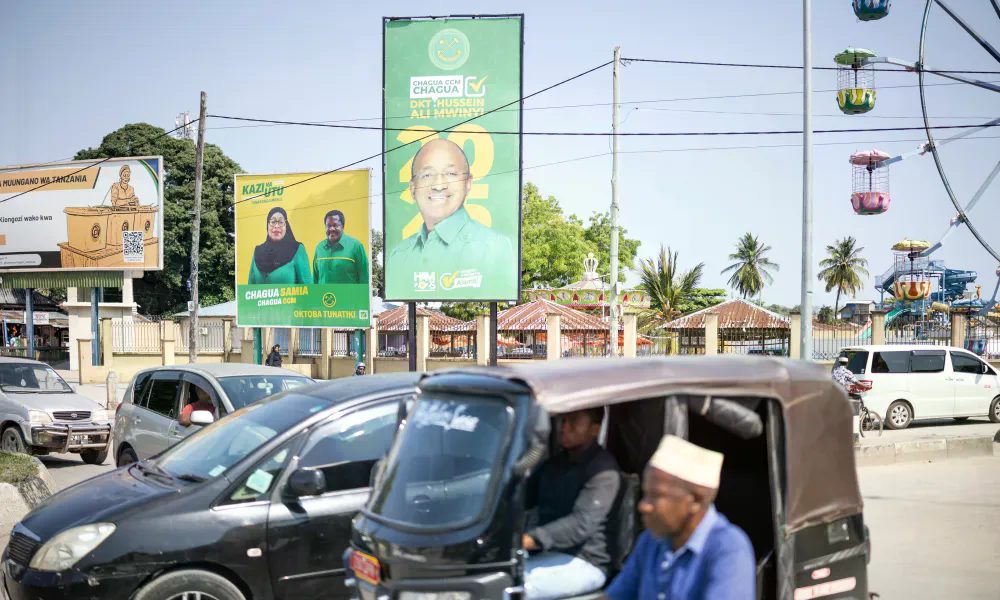
Dodoma, Tanzania – On a sweltering September day in Dodoma, the capital of Tanzania, the air at Jamhuri Stadium was alive with chants and drumbeats as Zuwena Mohamed, known professionally as Shilole, took the stage. Dressed in the green of the ruling Chama Cha Mapinduzi (CCM) party, she addressed a crowd, vowing to mobilize support for President Samia Suluhu Hassan. Her message was amplified through social media, where she has over 11 million followers on Instagram.
Her posts, which include pro-government content and a profile picture of the president, reflect a broader digital contest unfolding ahead of the October 29 election. As the country prepares for its vote, social media platforms have become battlegrounds for both government promotion and dissent.
In contrast to the official narrative, some users express concerns about the fairness of the election. Many choose to voice their opposition under pseudonyms or anonymous accounts, fearing repercussions from the government. This trend underscores the growing reliance on online spaces for political expression, particularly in a climate where open debate is increasingly restricted.
More than 37 million people are registered to vote in Tanzania, home to approximately 69 million residents. However, two major opposition parties, Chadema and ACT-Wazalendo, have been excluded from the race, leaving President Hassan’s CCM, Africa’s second-longest-serving party, with little competition. Chadema leader Tundu Lissu was arrested in April and now faces treason charges, further tightening the political environment.
Human rights organizations, including Human Rights Watch and Amnesty International, have criticized these exclusions as part of a broader pattern of repression. The government has denied these claims, stating that concerns about civic space and restrictions on political participation are unfounded. A government spokesperson, Gerson Msigwa, emphasized the administration’s commitment to human rights and fair elections.
Despite these assurances, many Tanzanians remain wary of expressing their views openly, prompting political discussions to shift to online platforms. Abel Kinyondo, a political researcher at the University of Dar-es-Salaam, noted that this transition is inevitable when public discourse is suppressed. “If you stop people from speaking openly, they will go online,” he said.
With over 49 million internet users and more than half the population under the voting age, TikTok has emerged as a key platform for political engagement. Users have posted content ranging from symbolic acts of protest to satirical commentary, reflecting the complex dynamics of public sentiment.
On X, formerly Twitter, activist Ananilea Nkya expressed deep concern about the state of the election, stating that many citizens feel hopeless about their future. Similar sentiments have been echoed by Tanzanians abroad, who have spoken out against the upcoming vote.
Mange Kimambi, a U.S.-based activist with a large following, has called for protests on election day, urging reforms to the electoral commission. His messages have sparked discussions among Tanzanians within the country, though the electoral commission has warned that discouraging voters may be illegal. Deputy Police Commissioner David Misime has also stated that authorities can trace online activity, even if users attempt to remain anonymous.
On the other side of the spectrum, CCM supporters, such as former Miss Tanzania Faraja Nyalandu, actively promote the party’s agenda online. Nyalandu praised President Hassan as a compassionate leader, while Imani Masiga, the party’s digital head, emphasized that most influencers campaign voluntarily. He acknowledged that some celebrities may receive logistical support but insisted that criticism is still permitted.
However, local digital rights group Tech & Media Convergence (TMC) argues that the government is intensifying its control over the digital space. According to TMC’s report, there has been a systematic effort to suppress independent voices and manage public discourse. Restrictions on platforms like X and YouTube, along with the suspension of JamiiForums, highlight this trend.
The government’s actions have raised concerns about the integrity of the electoral process. TMC warns that the erosion of pluralism risks voter apathy and undermines democratic principles. Despite these challenges, some individuals continue to speak out, risking their safety in the process.
Humphrey Polepole, a former CCM insider, recently accused the party of orchestrating a rigged election, a claim that led to his reported abduction. Police have launched an investigation into the incident.
As the election approaches, security has increased across several cities, signaling heightened vigilance. Analysts like Kinyondo urge the ruling party to focus on delivering on its promises rather than controlling narratives. With Tanzania’s potential for growth, the challenge remains whether the government can address pressing economic and social issues effectively.


